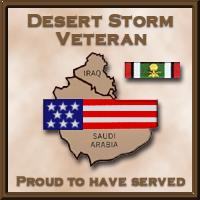Gulf War

At 2 am on August 2, 1990 Hussein ordered hundreds of his Iraqui forces to invade and occupy Kuwait. Hussein accused Kuwait of violating oil production limits set by the Organization of Petroleum Exporting Countries (OPEC). This action would have lowered oil prices and that would have compromised Hussein's standing. He felt that by seizing Kuwait, he could acquire the wealth and thereby eliminating the Iraqi debt. This would have also increased Iraq's power within OPEC. Hussein also felt that Iraq would benefit from Kuwait's coastline (which just so happened to have a great harbor), and that an invasion would keep his country's military busy so any attempts to force him out of power would be futile.
So this invasion pulled in 39 countries and the United Nations. The coalition included Afghanistan, Argentina, Australia, Bangladesh, Belsium, Canada, Czechoslovakia, Denmark, France, Germany, Great Britain, Greece, Honduras, Hungary, Italy, the Netherlands, New Zealand, Niger, Norway, Pakistan, Poland, Portugal, Senegal, Sierra Leone, Singapore, South Korea (the only member that was not also a member of the UN), Spain, Sweden, Turkey, and the United States. Arab members of the coalition were Bahrain, Egypt, Kuwait, Morocco, Oman, Qatar, Saudi Arabia, Syria, and the United Arab Emirates.
On August 6, the security council imposed an embargo that prohibited all trades with Iraq except for medical and food supplies. The next day, the US announced that they would start sending troops to the Gulf to defend Saudi Arabia from possible attack. August 8, Iraq announced its annexation of Kuwait, and the first US troops arrive in Saudi. On August 25, the UN Security council passed a resolution to allow enforcement of the embargo by military means. That following November the security coucil authorized the use of "all necessary means" to remove Iraq from Kuwait after January 15, 1991. Iraq didn't budge.
Around 3 am on January 17, 1991 the coalition started the air war. Iraq responded by launching "Scud" missiles at populated areas in Israel and Saudi Arabia. It was thought that Iraq was using these attacks on Israel to try to get them into the war. If Israel had struck back, Iraq might have succeded in forcing other Arab countries out of the current coalition by painting the war as an Arab-Israeli conflict. Israel however did not enter the war, making it much easier to keep the coalition united. On January 29, 1991, Iraqi troops occupied Khafji (a small Saudi Arabian coastal town near Kuwait), but the United States, Saudi and Qatari troops retook the town on January 31. February 24, coalition forces bagan a major ground attack into Iraq and Kuwait. The attack consisted of many large operations carried out at the same time. On February 27, Kuwait's capital, Kuwait City, was liberated and at 8 am on February 28, 1991, coalition attacks against Iraq ended. This was only about 100 hours after the ground attack began. On April 6, 1991 Iraq accepted the terms of a formal cease-fire agreement and on April 11, the UN Security Council officially declared an end to the war.
Desert Storm was not without its consequences. Around a third of the total American casualties came from the bombing of the marine barracks. May these soldiers rest in peace.
On a more personal note, I have to say that the Gulf War had a major impact on my life. Married but a short time, my husband was over there, we had a newborn son, and there was talk that my INRS (Inactive reserve status) could be activated at any time. I had only been out of active duty for 7 months at that time. I had never been so terrified in my life. I was so mad, that I didn't know who to lay the blame with. One moment I wanted to just eliminate Hussein, but then realized that even if he was gone, someone else would be there to take his place. I was mad at President Bush for deciding that my family was expendible even though I knew it wasn't true. I didn't know if I wanted to stay at Bragg and be with people who truly knew what I was going through, or go to my mother's house where her warm and gentle voice could once again sing me to sleep. It was a nightmare that wouldn't stop. Watching everything on CNN just further reminded me of my impending future and what it could possibly hold in store for me. My family was one of the lucky ones. I was able to stay home and watch my son crawl for the first time. I remember getting to watch him toddle haphazardly down the hall with his hand firmly attached to one end of the toilet paper while the other end still claimed residency to the bathroom wall, and enjoy the moments when he laid there asleep.
My husband came back home to us safe and secure, treasuring the moments where controlled chaos was the norm. Those were days that I would not want to live again, but occasionally I'll walk down that road where the line in the sand wasn't so clearly marked. Maybe someday, that line will only be visible within the hearts of those who served.


